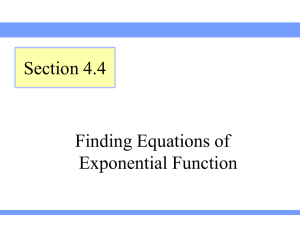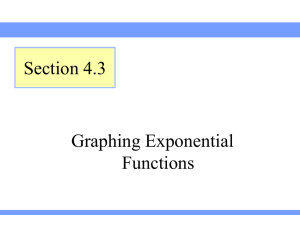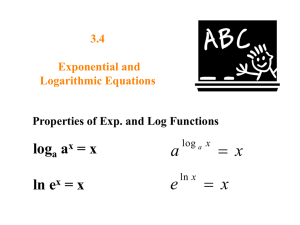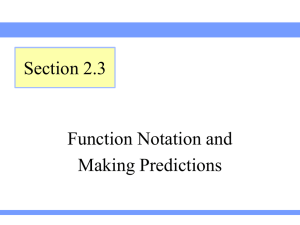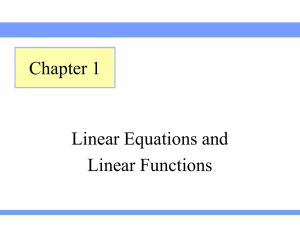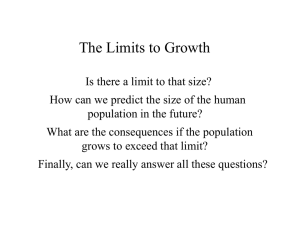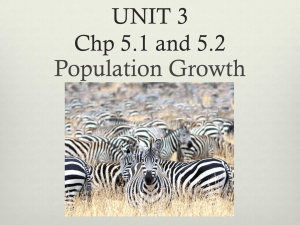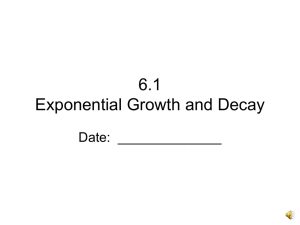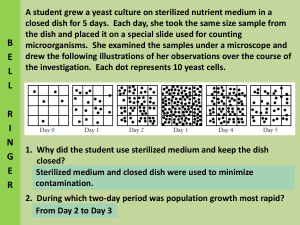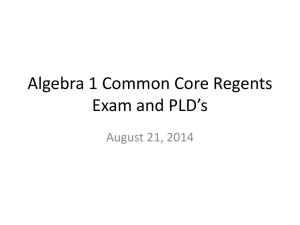6-APP-Exponential Modeling
advertisement
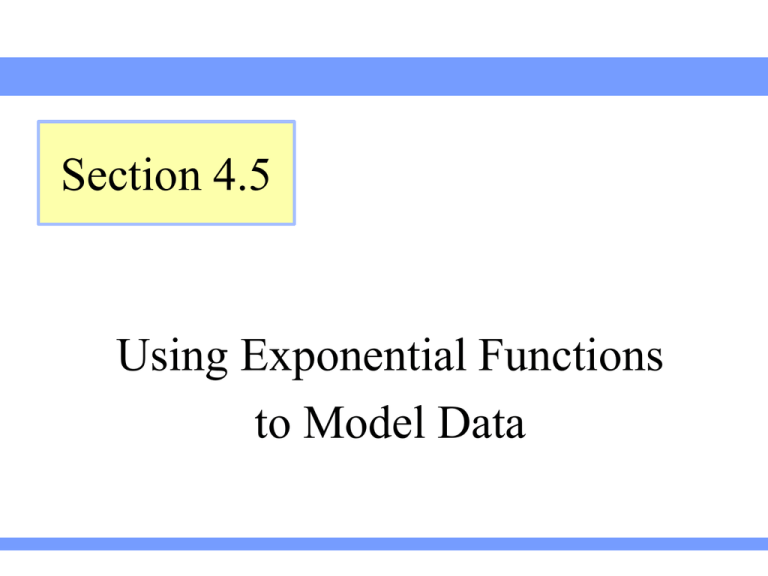
Section 4.5 Using Exponential Functions to Model Data Exponential Model, Exponential Related, Approximately Exponentially Related Using Base Multiplier Property to Find a Model Definition An exponential model is an exponential function, or its graph, that describes the relationship between two quantities for an authentic situation. If all of the data points for a situation lie on an exponential curve, then we say that the independent and dependent variables are exponentially related. (Continues) Section 4.5 Lehmann, Intermediate Algebra, 4ed Slide 2 Finding an Equation of an Exponential Curve Using the Base Multiplier Property to Find Exponential Functions Definition Continued If no exponential curve contains all of the data points, but an exponential curve comes close to all of the data points (and perhaps contains some of them), then we say that the variables are approximately exponentially related. Section 4.5 Lehmann, Intermediate Algebra, 4ed Slide 3 Exponential Model, Exponential Related, Approximately Exponentially Related Using Base Multiplier Property to Find a Model Example Suppose that a peach has 3 million bacteria on it at noon on Monday and that one bacterium divides into two bacteria every hour, on average. Let B be the number of bacteria (in millions) on the peach at t hours after noon on Monday. Section 4.5 Lehmann, Intermediate Algebra, 4ed Slide 4 Exponential Model, Exponential Related, Approximately Exponentially Related Using Base Multiplier Property to Find a Model Example Continued 1. Find an equation of f Solution • Create table with assumptions • As t increases by 1, B changes by multiplying by 2 • So, model is of the form t f(t) = a(2) Section 4.5 Lehmann, Intermediate Algebra, 4ed Slide 5 Exponential Model, Exponential Related, Approximately Exponentially Related Using Base Multiplier Property to Find a Model Solution Continued • B-intercept is (0, 3), so t f(t) = 3(2) • Verify solution using graphing calculator Example Continued 2. Predict the number of bacteria on the peach at noon on Tuesday. Section 4.5 Lehmann, Intermediate Algebra, 4ed Slide 6 Exponential Model, Exponential Related, Approximately Exponentially Related Using Base Multiplier Property to Find a Model Solution • Use t = 24 to represent noon on Tuesday • Substitute 24 for t • According to the model there would be 50,331,648 million bacteria • Omit “million”: 50,331,648,000,000 • That’s about 50 trillion bacteria at noon on Tuesday Section 4.5 Lehmann, Intermediate Algebra, 4ed Slide 7 Modeling with an Exponential Function Using Base Multiplier Property to Find a Model Summary t • Exponential function y = ab the y-intercept is (0, a) • y is the quantity at time t • a is the quantity at time t = 0 Example A person invests $5000 in an account that earns 6% interest compounded annually. 1. Let V = f(t) be the value of the account at t years after the money is invested. Find an equation of f. Section 4.5 Lehmann, Intermediate Algebra, 4ed Slide 8 Modeling with an Exponential Function Using Base Multiplier Property to Find a Model Solution • Each year the investment value is the previous value (100%) plus 6% of the previous value • Each year the investment is 106% of the previous year • As t increases by 1, the vale of V is multiplied by 1.06: b = 1.06 • Value of account starts at $5000: a = 5000 t • f(t) = 5000(1.06) Section 4.5 Lehmann, Intermediate Algebra, 4ed Slide 9 Modeling with an Exponential Function Using Base Multiplier Property to Find a Model Example Continued 2. What will be the value after 10 years? Solution • Substitute 10 for t • Value will be $8954.24 in 10 years Section 4.5 Lehmann, Intermediate Algebra, 4ed Slide 10 Definition: Half-life Half-life Applications Definition If a quantity decays exponentially, the half-life is the amount of time it takes for that quantity to be reduces to half. Section 4.5 Lehmann, Intermediate Algebra, 4ed Slide 11 Definition: Half-life Half-life Applications Example The world’s worst nuclear accident occurred in Chernobyl, Ukraine, on April 26, 1986. Immediately afterward, 28 people died from acute radiation sickness. So far, about 25,000 people have died from exposure to radiation, mostly due to the release of the radioactive element cesium-137 (Source: Medicine Worldwide). Cesium-137 has a half-life of 30 years. Let P = f (t) be the percent of the cesium-137 that remains at t years since 1986. Section 4.5 Lehmann, Intermediate Algebra, 4ed Slide 12 Modeling with an Exponential Function Half-life Applications Example Continued 1. Find an equation of f . Solution Method 1 • At t = 0, 100% of the cesium-137 is present • At t = 30, ½(100) = 50 percent is present • At t = 60, ½(½)(100) = 25 percent • Situation can be modeled using exponential function Section 4.5 Lehmann, Intermediate Algebra, 4ed Slide 13 Modeling with an Exponential Function Half-life Applications Solution Continued • Each exponent in second column is equal to the value of t in the first column divided by 30 • Equation of f is: 1 f t 100 2 Section 4.5 t 30 Lehmann, Intermediate Algebra, 4ed Slide 14 Modeling with an Exponential Function Half-life Applications Solution Continued • Use a graphing calculator table and graph to verify solution t 1 t 1 t 30 1 30 1 1 30 f t 100 100 100 2 2 2 1 30 • 1 . 0.977 can be written f t 100 0.977 t 2 Section 4.5 Lehmann, Intermediate Algebra, 4ed Slide 15 Modeling with an Exponential Function Half-life Applications Solution Continued Method 2 • We know the points (0, 100) and (30, 50) • P-intercept is (0, 100), so a = 100 • Substitute (30, 50) Section 4.5 Lehmann, Intermediate Algebra, 4ed Slide 16 Modeling with an Exponential Function Half-life Applications Solution Continued 1 • Equation is the same f t 100 2 Section 4.5 Lehmann, Intermediate Algebra, 4ed t 30 Slide 17 Modeling with an Exponential Function Half-life Applications Example Continued 2. Describe the meaning of the base of f. Solution • Base of f is 0.977 • Each year 97.7% of the previous year’s cesium-137 is present • Or, cesium-137 decays by 2.3% per year Section 4.5 Lehmann, Intermediate Algebra, 4ed Slide 18 Modeling with an Exponential Function Half-life Applications Example Continued 3. What percent of the cesium-137 will remain in 2010? Solution • 2010 – 1986 = 24 • Substitute 24 for t • In 2010, about 57.2% of the cesium-137 will remain Section 4.5 Lehmann, Intermediate Algebra, 4ed Slide 19 Meaning of the Base of an Exponential Function Half-life Applications Summary t If f(t) = ab , where a > 0, models a quantity at time t, then the percentage of change is constant. In particular, • If b > 1, then the quantity grows exponentially at a rate of b − 1 percent (in decimal form) per unit of time. • If 0 < b < 1, then the quantity decays exponentially at a rate of 1 − b percent (in decimal form) per unit of time. Section 4.5 Lehmann, Intermediate Algebra, 4ed Slide 20 Modeling with an Exponential Function F i n d i n g a M o d e l b y U s i n g D a t a D e s c r i b e d i n Wo r d s Example Sales of energy and nutrition bars have grown approximately exponentially from $0.2 billion in 1997 to $1.2 billion in 2004 (Source: Frost & Sullivan). Predict the sales in 2011. Solution • Let s be the sales (in billions of dollars) of energy and nutrition bars • Let t be the years since 1997 Section 4.5 Lehmann, Intermediate Algebra, 4ed Slide 21 Modeling with an Exponential Function F i n d i n g a M o d e l b y U s i n g D a t a D e s c r i b e d i n Wo r d s Solution Continued • Create a table • t and s are approx. exponential t • We want s = ab • S-intercept is (0, 0.2) • Substitute (7, 1.2) and solve for b Section 4.5 Lehmann, Intermediate Algebra, 4ed Slide 22 Modeling with an Exponential Function F i n d i n g a M o d e l b y U s i n g D a t a D e s c r i b e d i n Wo r d s Solution Continued • Substitute 1.292 for b • 2011 – 1997 = 14, so substitute 14 for t Section 4.5 Lehmann, Intermediate Algebra, 4ed Slide 23 Modeling with an Exponential Function F i n d i n g a M o d e l b y U s i n g D a t a D e s c r i b e d i n Wo r d s Solution Continued • Model predicts that sales will reach $7.22 billion in 2011 • Verify work on graphing calculator Section 4.5 Lehmann, Intermediate Algebra, 4ed Slide 24
